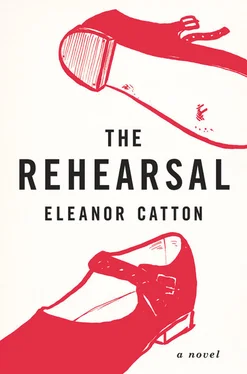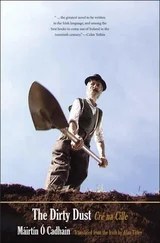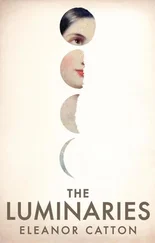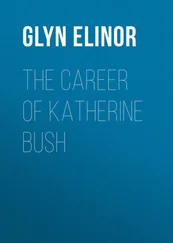From where Stanley sat cross-legged in the audience, the pinioned drowning boy looked headless. Stanley could see only his damp collar and the last white knob of his spine over the lip of the water-trough as he tried in vain to struggle free. He watched as the boy slapped the floorboards and writhed and the water slopped and thrashed and the accordion kept playing its jolly provincial tune. After almost twenty seconds the audience began to shift and mutter, and someone shouted, “Let him go!” The masked boy looked up with a jerk, as if jolted out of a reverie. He released his victim immediately, jumping up and stepping backward in a nimble little leap, and the volunteer reared his dripping head, coughing and spitting and taking great savage lungfuls of air. His eyes were streaming and pink-rimmed and his face was white. He sat for a moment in hurt bewilderment, quivering and gasping weakly in the middle of the stage.
The audience watched him regain his breath in silence. They met his gaze with a kind of wary suspicion, all of them thinking that he was probably a plant, a prearranged assistant who any moment now was going to leap up and laugh and cuff them on the shoulder and say, “I got you good.” They regarded him doubtfully. They were not yet convinced. A few of the students looked around to measure the approval or affirmation of the tutor, but the Head of Acting had gone and they were alone, a baffled motley patch of black in the middle of the gymnasium floor.
On stage the masked boy was standing impassively, his legs apart, his hands together behind his back. Then in one fluid motion he raised his arm, and two other masked boys ran forward, grabbed the gasping volunteer by his arms, and hauled him to his feet. The first boy ran forward and there was a flurried snipping shoving movement, and then the volunteer boy was shoved to his knees once more and slapped hard across his face. The two boys who were holding him began to tug at his shirt, and Stanley realized that the boy’s clothes had been cut off him, sliced from the hem to the collar up the length of his spine. The masked boys tore away the ragged shirt and jumper, and then darted back, leaving him pale and shirtless and shivering in the middle of the floor.
The masked boy looked directly at the audience now, as if in challenge. The first-years looked back in bewilderment.
“That sucks, man,” the volunteer boy said suddenly, looking at the torn remains of his jersey and his shirt wadded in a ragged pile in front of him. His voice was thin. “That’s my favorite shirt.”
The masked boy didn’t flinch. He kept looking at the audience, as if waiting for somebody to speak. Nobody did. He leaped forward, and the scissors flashed out again, and in a swift careful movement he grabbed a fistful of the volunteer boy’s hair from the top of his head and cut it off with a thick silver snip .
There was a collective intake of breath from the students on the floor. The masked boy stood holding the clump of brown fur aloft like it was a trophy scalp. Nobody moved. There was a long and horrible pause, and then all of a sudden the volunteer boy jumped up and bolted. The masked boys tried too late to grab him—they missed. He jumped off the edge of the stage and ran out of the gymnasium without looking back.
The masked boy watched him leave and drew himself up a little higher.
“This is an exercise in the Theater of Cruelty,” he said. “We are here to show you what it means to really feel something.” He gave an odd little bow and then the curtain fell, whistling swiftly down like a blade. The bottom folds hit the stage floor with a thump and then the first-years were alone in the gymnasium. They could hear the soft apologetic patter of the actors’ feet as on the other side of the curtain they dispersed and then finally disappeared.
May
“Come with me,” was all the Head of Movement said when Stanley found him, and Stanley followed his sloping barefoot tread all the way from the courtyard to the office upstairs, both of them silent, Stanley falling back as he tried to swallow and mask his tears. He was surprised at the violence of his feelings.
“I’ve come to complain,” was all he’d said, standing with his bony knees together and squeezing the blood from his hands. “I can’t find the Head of Acting. I want to complain.”
Through his distress Stanley found himself a little relieved that he had found the Head of Acting’s office locked and the staffroom empty. The Head of Movement was infinitely more approachable than the older man, who peered through his glasses at the students with a kind of impassive chill and wore short sleeves even in winter, as if he were cold-blooded and felt no difference.
Now, in the still of the office, the Head of Movement placed his palms together in an entreating way. “Stanley,” he said. “Stanley, what do you think you would do if you paid to go and see a play which included a rape scene, and during this rape scene the assailant began to really rape his victim?”
“I’d say something,” Stanley said. His voice quavered a little and he reached up to rub his cheek with the heel of his hand.
“You would not,” said the Head of Movement. He laced his fingers together. “You would shift in your chair and you would think that this was terribly avant-garde but still it really wasn’t your thing and you would marvel at how realistic everything was looking and maybe if you were very uncomfortable you would look around you to see what everyone else was making of it. And then if you really started to feel like something was amiss, maybe if the victim was obviously crying out for help, or if everybody in the audience was clearly feeling uncomfortable, then you might stand up and shout something out. But it would take you a very long time. Most likely by the time you got the courage to fight back, the scene would be over.”
Stanley was at a loss for what to say.
“I know it’s a horrible thing to have to imagine,” the Head of Movement said, “but I’m trying to make a point. I’m just trying to point out that if a person is standing onstage in front of an auditorium full of people then ‘real’ is a useless word. ‘Real’ describes nothing on stage. The stage only cares whether something looks real. If it looks real, then whether it is real or not is immaterial. It doesn’t matter. That’s the heart of it.”
“That’s not what you told us in Movement class,” Stanley said, with rising anger. “You said what was important was truth and not sincerity. All that stuff you said about mime. I believed all that.”
The Head of Movement sighed and pressed his fingers to his lips. “No,” he said, and paused for a moment, shaking his head and gathering his thoughts together. He drew a weary breath. “No. We’re talking about two different things now.
“Stanley,” he said, “think how you would feel if you acted in a play in which your character had to die, and after the performance everybody came up to you and said I really believed you, I really honestly believed that you had died. I saw you dead onstage and I felt myself thinking, Oh my God, he’s actually dead . You would be rapt. It would be the best possible compliment anybody could give you: that your pretence, your big game of let’s-pretend, looked so real that somebody actually thought it was real.”
“But I’m real,” Stanley said, realizing to his displeasure that he was again on the verge of tears. “My performance might be pretend, but I’m not.”
“That’s exactly it,” said the Head of Movement swiftly. “If you are a good actor, you will be using your emotions, displaying your laughter, your tears, your sexuality, your insecurities. There’s always this doubleness at play. You and the character you are playing both have to be transparent. You have to look through the one to see the other. That is why being an actor is such a difficult job. It really is you up there.”
Читать дальше












